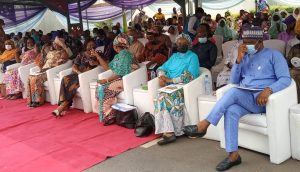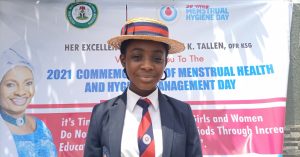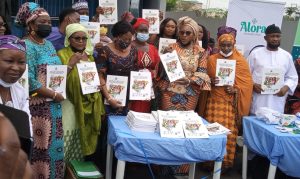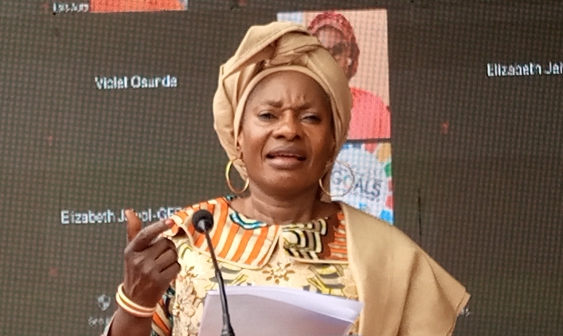Breaking the stigma that exists around menstruation calls for collaboration – DAME Tallen

Oru Leonard
The Minister of Women Affairs in Nigeria, Pauline Tallen has said that breaking the stigma and silence that exists around menstruation calls for collaboration from relevant stakeholders.
The Minister stated this during the commemoration of the 2021 World Menstrual Hygiene Day, the Ministry of Women Affairs on Friday, adding that infrastructure enablers such as water supply, sanitation, hand washing facility, toilet facilities and an environmentally safe and hygienic disposal system are put in place for healthy management of menstruation.
In her remarks, Dame Tallen noted that the theme, “It’s time for action” to ensure girls and women do not feel limited by their periods through increased education and menstrual hygiene, emphasizes the need for a joint action to promote good menstrual health and hygiene management and break stigmas that exist around young girls and women during their menstrual cycle.
“Globally, girls are forced to miss school due to lack of sanitary items. According to UNICEF, one in 10 African girls skip school during menstruation, this has caused some to drop out entirely because this monthly pattern of missing out on education has devastating long term effects, not only in terms of educational development, but also on the psyche of young girls and women”, she stated.


She commended the role of the Federal Ministry of Water Resources and Ministry of Environment for the successful campaign of hygiene management among families and households on Open Free Defecation and Clean Nigeria Campaign, noting that their efforts will go a long way to address some of the challenges of menstruation.
Dame Talllen who launched the Menstrual Pad Bank to take care of emergencies most women face during menstruation appealed to all stakeholders from the public and private sector to ensure that women have access to clean toilet facilities or a convenient place to manage their period in workplaces, schools, or while in transit.
She further called on others to also establish the pad banks in their organizations, adding the Ministry will continue to drive meaningful changes towards ending challenges girls face during their period and ensure that they have the knowledge required to become confident women.
Earlier, the Permanent Secretary, Dr. Anthonia Ekpa, said the celebration is an annual event to raise awareness in breaking the silence on Menstrual Hygiene issues, providing space for free expression of concerns and demand for a supportive and protective environment for the effective and hygienic management of menstruation.
She noted that it is also aimed at educating the public, young girls and women of reproductive age on appropriate means of managing their cycles in a dignified manner without shame, adding that menstruation is a fundamental issue of human rights, dignity, and public health for every woman.
She assured that the Ministry will continue to sustain the campaign to ensure that girls are prepared for the changes their body goes through monthly.
“We will encourage schools to make sanitary pads available to cover girls who are unprepared for their menstruation. Pads not being made available impact on the productivity of the girls in school and so, we will continue to push for sanitary pads to be made not only cheap but available”, Amb Ekpa noted.
Teenage girls from some secondary schools, special schools and IDP camps were in attendance. A student of Start Rite Day Secondary School, Miss Zipporah Egenege gave a talk on menstural hygiene and performances from teenagers.

The Ministry also unveiled a comprehensive survey/stakeholder mapping and analysis on Menstrual Health Hygiene Management (MHHM) in Nigeria.
Development partners, stakeholders, and MDAs such as UNICEF, UN Women, Action Against Hunger, WaterAid, Ministry of Health, Ministry of Water Resources, Ministry of Labor and others pledged collaborative efforts to ensure that women have access to clean toilet facilities or a convenient place to manage their period in workplaces, schools, or while in transit, and also pledged their commitments to do more to put an end to the challenges girls face during their period.




